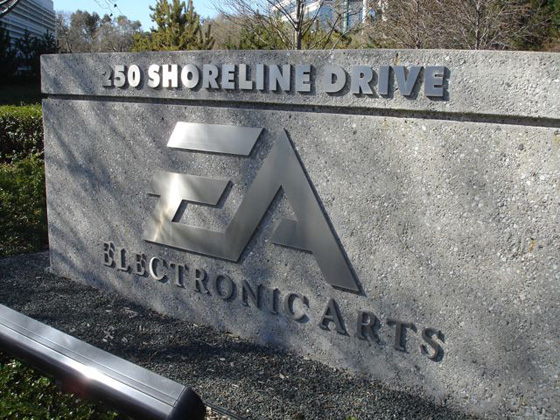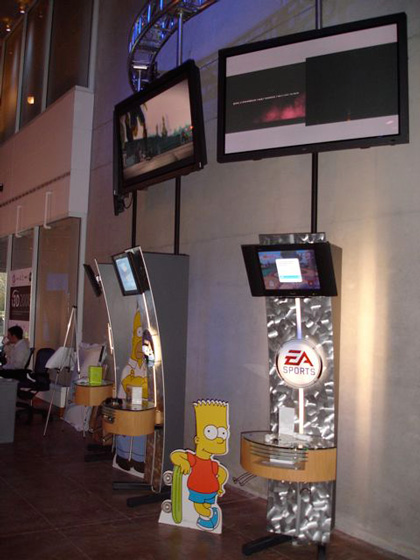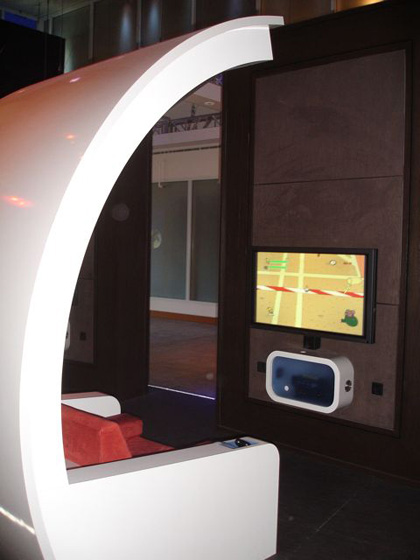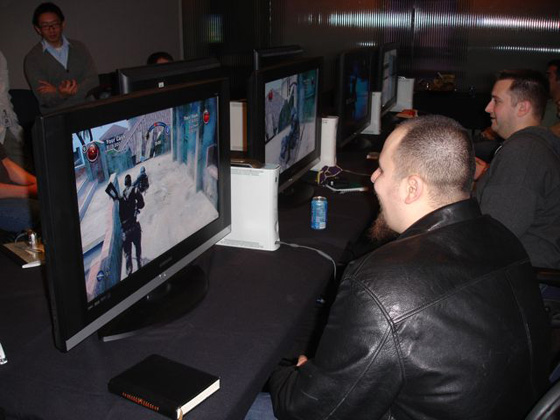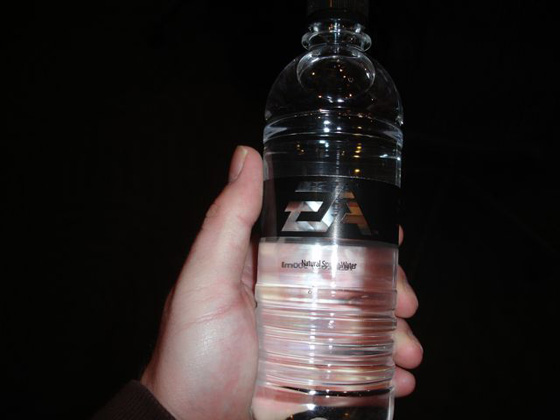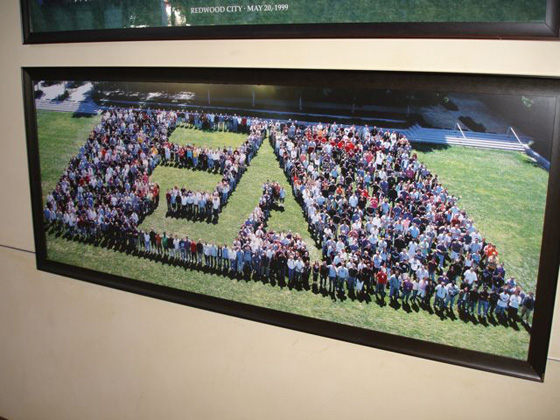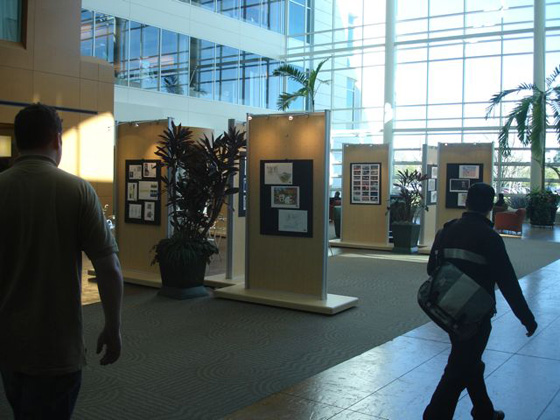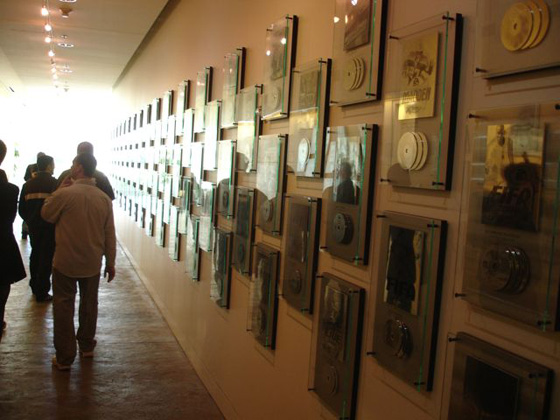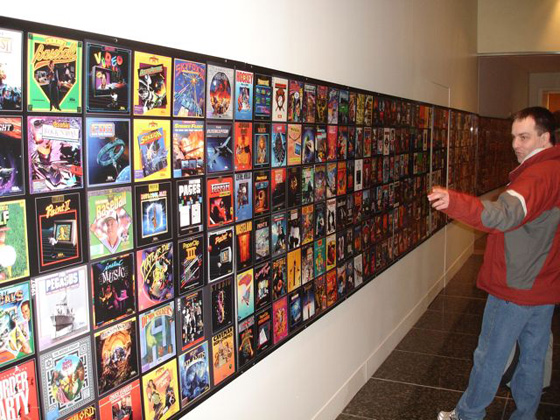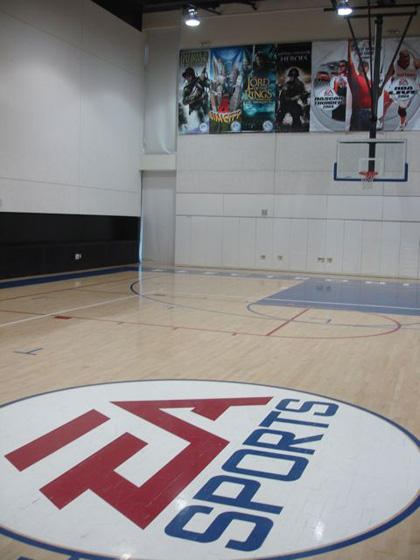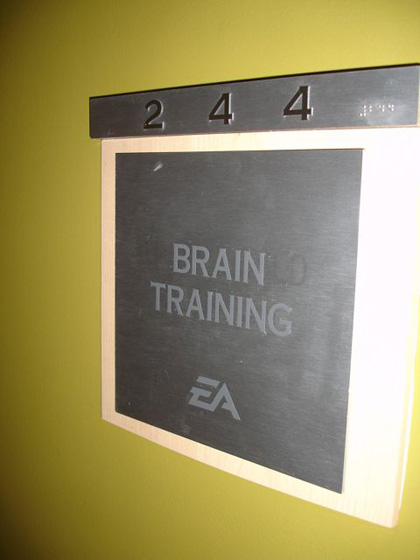Greetings humans, Monki here with a recap of a event I was lucky enough to attend a few days ago. Electronic Arts brought me out to California to do a bit of a community event for their recently released Burnout Paradise.
I've been a fan of the Burnout series, so going out to Redwood City (just south of San Francisco) to visit the EA campus and meet the creative lead on Paradise was going to be a sweet little adventure.
The day started off with a quick jaunt from the hotel over to EA's Redwood Studios (EARS for short) and an overwhelmingly cool lobby area. Apparently they took a bunch of stuff from an E3 show a few years back and dropped it in to their lobby. I kind of felt like I was walking in to the bigass toy factory from Robin William's Toys movie. Immediately you start to grasp the sheer size of the Electronic Art's main campus. This fucker is huge.
After signing our names in blood at the front desk we were treated to a nice little surprise. Apparently we had ended up at EA on the same day that the Army of Two team was showing off their final build to some folks at EA. So before that began we had a chance to check out some multiplayer Army of Two.
The multiplayer aspect of Army of Two is pretty cool. As opposed to going for strictly kills, you actually make an effort to go for objectives during the game. Something like "kill the VIP" might appear and suddenly you have two teams of two trying to go after a single NPC...or take a location on the map. Throw in some extra computer-controlled enemies for extra fun. It adds an interesting element to multiplayer, something I'm looking forward to getting in to more.
Between matches I had a chance to talk with Matt Turner, the assistant producer on Army of Two.
Monki: Sweet, so what has taken so long for ARMY OF TWO to come out? I know there's been a lot of change, like from a goofy sidekick type game to more of an action based, so how did that come about?
Matt Turner: When it came time, we were done and had a game ready to go, but we weren't quite a hundred percent satisfied all around and there was some stuff we just didn't like and weren't really happy with and the "people upstairs" were really cool and gave us a chance to really go through and polish it and really perfect the things we wanted to change. They gave us three months and that amazing. You can do so much in a few months... I don't know if you saw the code from October or not...
Monki: No.
Matt Turner: The HUD has changed, the lighting, the graphics... there's a lot of it and it's been polished and refined whereas before it was there, like the core, but it didn't have the right touches to it and that's what took so long, but I think that time translated really well in what we have in our game.
Monki: Cool, now why the decision for a third-person shooter? I've seen that come out a lot, like GEARS OF WAR and what not.
Matt Turner: I can't really answer that question, because I came on the team late, so I wasn't there for the actual genesis of the project, so I don't know what the idea for a third person shooter was. I know that the co-op aspect was a big thing. We wanted a game... There's a lot of games that have co-op features or options, but don't really focus or highlight the co-op aspects of the game, so we wanted to fill that gap and make a game that, at its best, must be played in co-op and it's made for being played co-op, so there's lots of mechanics and functions of the game that are purely for co-op.
Monki: So as far as the co-op goes, what happens when you are playing single player? Like without a partner, how does that work?
Matt Turner: You have a partner AI, which was a big challenge... We really wanted to make an AI that was just like any other person. I think we did that really well actually, I mean it's really fun to play with and obviously the game is at its optimum with a partner or XBOX Live, but with a partner AI it's actually really fun. You have a very basic command system, where with your D pad you have "advance," "hold position," and "cover me." With each one of those you have both "aggressive" and "passive" mode, so you can tell him what to do based on how you want him to be and with that loose guideline, he controls himself and he will go after and kill people. If you take a backseat role, he will take point and lead. If you want to lead, he'll follow you. If you mess up, he will give you a whack on the back of the head... So it's actually pretty satisfying and I play a lot with him and it's really fun.
Monki: I like that you refer to him as "him" and not as "the computer," so that definitely says something cool. What kind of surprises are in the game that people might find pretty shocking or pretty amusing?
Matt Turner: I think people are just going to be interested in, not shocked, but it will be interesting to see people react to the actual real life countries in there, like Somalia, Afghanistan, Iraq, China... It's like they exist and are actually hotspots in the world right now and we just took them because they are actually really beautiful backdrops for a shooter game. If people seem to react to it in a political sense, we didn't intend for that, we just liked the idea of having these places and all of these people... So that's not really shocking, but interesting. I guess one of the shocking things that we actually did at the end of cutting was the tampon mini game, which there was a lot of hype about...
Monki: So that's been cut now?
Matt Turner: We have completely removed it from the game. It was a really cool idea and it was funny in the first couple times and it was new and different and kind of gross and they loved it, but the reality was how it worked was... It would take you out of the game completely and you would go into this little world as a mini-game, right? So you'd be in the middle of a fire fight, then all of a sudden in this thing... It would just take you out of the experience.
Monki: OK.
Matt Turner: We felt it kind of broke the flow of the game, so... This new system is like you grab your partner when he is dying and you drag him under cover and hold your button and you heal him. It's infinite and you can do it anywhere, as long as you can get to your partner and get him into cover, you can heal him. This game's a little more forgiving and also you are always involved in the action. When you are injured, you can still pull, you can still shoot, you can still kill, so you're always in the fight no matter how hurt you are, so it keeps the flow going along, but we cut that tampon part which was, I think, the shock value...
Monki: That's cool. Are there any easter eggs that we should keep an eye out for? I mean this is a pretty much finished version of the game, so are there any hints?
Matt Turner: I'm going to say "hints" are the exploratory items, so keep an eye out for those and the silver briefcases that are strewn throughout the maps that will give you a little extra cash, so you can upgrade your guns a little faster, which is just one of the things I'll say. I won't go into too much detail, but keep your eyes pealed for metal briefcases that look like they have money in them.
Army of Two just hit the shelves this week and I'll definitely be checking it out. It's refreshing to see cooperative play making such a huge comeback in this generation of consoles. I suppose there is a big enough community of people who would rather work together to accomplish a goal than to just shoot each other and curse like 12 year olds. Here's hoping the trend keeps up.
Before heading out of the room I grabbed myself an official EA bottle of water. After consuming it I suddenly had an urge to play The Sims 2 and I pre-ordered Spore. I don't know what came over me.
From that conference room we headed out to visit the rest of the EA Redwood Studios campus...and "campus" is the correct word for it. This place is enormous. 7 or 8 buildings comprise the entire ground plan with a huge lawn in between it all. The EARS lawn actually appeared in one of the NFL Street titles from a few years ago. After wandering for a while I had the distinct feeling I was walking around the six-pack and the south mall at the University of Texas.
We wandered in to the lobby of one of the main buildings and up all over the place were sketches from the recent EA title The Simpsons. Reference art, printed renders of backgrounds, script pages...they were displayed proudly in this central area.
And right at the front of the building was EA's very own Starbucks.
I guess when you are one of the largest publishers in the world, you can get perks like having your own Starbucks in-house. Personally I can't wait until the AICN headquarters get a Shipley's Donuts in the lobby. Mmmm...
From there we wandered down a hall that contained a lot of Electronic Art's history. One wall was lined with nothing but million plus selling plaques from the EA library of titles.
As you can see, there are a crapload of games adorning those walls. More EA history was displayed in various glass cases...games, stock certificates, a Sega Genesis that had been deconstructed to run code because Sega couldn't produce enough test kits to supply their publishers (so EA had to figure it out on their own), a trashed motorcycle from the Road Rash days (no word on whether or not a new Rash title is coming soon) and one of the biggest pieces of EA lore, an original copy of the first Madden Football title:
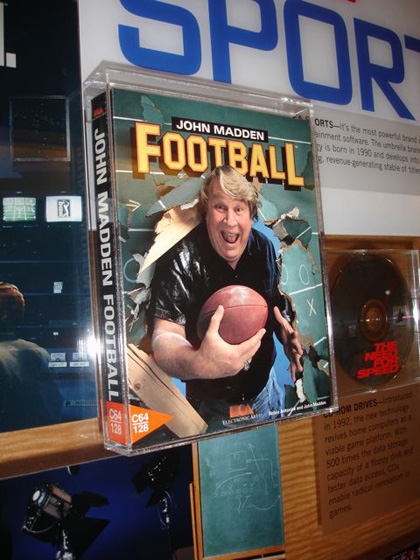
Another hall contained nothing but box covers lining the walls, showing off the vast library of titles that EA has delivered over the past few decades.
See if you can spot any of your favorites there. I believe that section is from the early 80s. Personally I can spot a copy of Skate or Die, which makes me very happy. Another title I saw on the wall that is in desperate need of an update is Mutant League Football. With EA's new take on "fun" games (Battlefield Heros, for example) why shouldn't we see a rehash of the Mutant League titles?
After visiting the past accomplishments of EA, we took a quick peek into the EA Sports branded full-size gym on campus.
It was all pretty overwhelming...this place is pretty awesome and I can't imagine what it is like to work there. They then took me to a special room before we went to go check out Burnout Paradise with some of the guys who developed it. I'm not sure why we had to go to this other room first...
I LOVE ALL THINGS ELECTRONIC ARTS.
Ahem...I mean, from there they took us to another room lined with big LCD screens each with it's own 360 and copy of Burnout Paradise. At this point I hadn't had a whole lot of experience with the game, so I looked forward to playing it with some folks there to help out. (I was a huge fan of Revenge, but hadn't put a lot of time in yet with Paradise.)
Before we got in to some challenges, I had a chance to talk with the creative lead on Paradise, Mr. Craig Sullivan from Criterion Games:
Monki: So how long have you been with Criterion?
Craig : A long time, even though I look fresh-faced and young. I've been at Criterion for almost twelve years, so I've helped out with all of the BURNOUT games, way back since BURNOUT 1 in 2001, but this is the first BURNOUT where I've officially been on the team and actually been a lead designer. The previous project I worked on was me as a lead designer on BLACK and I don't know if you are familiar with that or not.
Monki: Yeah.
Craig: I've been there a long time and a lot of the core team, from the original BURNOUT and from BLACK as well, worked on BURNOUT PARADISE, so it's still the same set of guys. We have a lot of fun in the office mainly swearing at each other, but it's still the same guys and they are really good at working on both machines and are just really committed to making the best software in the world and just making something new and innovative and fun, so I love working there and I'm sure I will be there for some time to come.
Monki: Sweet, so what has been your progression, as far as what you were doing on BURNOUT 1 to... obviously now you are creative lead...
Craig: On BURNOUT 1 I was... actually I was working on another project we did called AIRBLADE at the time and I just helped out with some of the testing stuff. On 2, I helped out with a little of the crash stuff. On three, I did a lot more on the crash working with elite designer Chris Roberts on the placement of the jumps and the pickups and the flow of traffic and stuff and just helping to tune all of that stuff. It ended up on REVENGE... Whenever we make a game, because Criterion is a close knit company, we all test it at the end, everybody plays the game and we all have input into what we think we should change and what we think we should polish and just really finely tune and tweak and balance the games we make. I hope people can see that in the software we make. We play our games a lot during the course of development and we try to make it as good an experience as possible, so yeah I helped out on REVENGE and then I actually didn't join the BURNOUT PARADISE team until about ten months from the end. It was a team of 120 people at its maximum size with over two years of working on this game. It's a big game, like forty artists making that world full time for two years, because there is a lot of geometry and it's all hand crafted. Everything in the game is new. Nothing is taken from old BURNOUTs and a lot of people think that you know "Oh, they changed the car handling a little bit or I've seen that building in a previous BURNOUT..." You might have seen something like it in a previous BURNOUT and the car might feel the same and it might drift the same, but that's only because we made it from scratch and we made it feel like previous BURNOUTs, so that it still feels nice to drift the cars.
Monki: And there's a lot of homages in there too, right? Like from previous ones, like some of the same cars and some of the same music and what not.
Craig: Yeah, like the BURNOUT 2 car is in there and there's a pink Cadillac car in there as well and there's gangster cars and the REVENGE race is in there, though we changed the name slightly. We took the things that we knew people liked about the other games and we put them into BURNOUT PARADISE and the naming of some of the roads in the areas, like Palm Bay Heights and stuff. We've done so many of these games now that we are kind of building up our own little world that we can keep referencing and I think players like that, so it's cool.
Monki: So what brought forth the whole jump to this online community where you can jump in and out and everything? What was the main drive behind that?
Craig: We play a lot of games online and we really thought the online experience was bad. Getting online with the whole PC paradigm of "I'm playing offline. I now want to go online, so the first thing I have to do is stop playing. Now I have to look at a list while I connect and then I go in and maybe I get booted or maybe the game doesn't exist by the time I get there and I'm not playing the game anymore, I'm wasting time." Sometimes you will be playing another game, any game, like an FPS or a driving game or a platform game or whatever and you go through this cycle and you end up wasting ten or fifteen minutes of playtime. Some people kind of get frustrated by that really quickly. I do. I'll try to go online and I'll think "You know what? I can't be asked, so I'll go back offline and do something else." We just looked at that and we thought "It doesn't have to be like that. Why should it be like this?" People are just settling for something that we think we can change and innovate and improve, so when we came up with the easy drive system and our online guys, a really really smart bunch of guys, said "I think we can just do this and have it so that you are driving down a road at 200 miles an hour, you hit the D pad three times and then you're online and nothing changes." We actually had a version of the game where literally nothing changed and you were just online right away, but people didn't actually notice that they were online at all, so that's why we do the "warping" effect when you go online. The only reason we do that is to give you a visual indication in the fact that you are going online, because BURNOUT PARADISE is like the first game where you can actually accidentally go online, which is kind of a weird thing to say, but we think online needs to be more accessible, quicker to get on and offline, more fun, and more sociable and that's what we have really tried to do with the game. I think a lot of people are going to be looking at the stuff we have done and be enthused by it, because I think online needs to be better.
Monki: Online is definitely the next generation and that's what everything is going towards, except for the Wii, but...
Craig: It needs to be easy to do that. It needs to be fun!
Monki: You see a lot of reporters saying things like "Video games influence kids to go out and shoot people." What about video games influence people to go out and drive crazy? I've always wondered about that, because if games are supposed to influence you, then why doesn't this do it? What do you say to that?
Craig: I don't know, I mean I really don't believe that... There's a lot of talk about this whole thing of video games influencing people to go do stuff and I don't actually think people are that stupid. I think most of the time, the people who say these things don't play videogames and they just think that that's their perception of how it happens. The BURNOUT team don't drive like psychos and crash their cars all over the place, because we understand the difference between playing a videogame where it's OK to crash a car... There's no driver in the car in BURNOUT and you can crash the car at 200 miles an hour and it resets and you drive off where no one's hurt or injured. I was the lead designer on BLACK and I went to the gun store and fired guns for reference, but then I didn't run around with a gun and do bad things and when I was playing the game, it was fun for me to run around with an Uzi and blow stuff up, but I didn't do that in real life, because... I think we have to give people some credit sometimes, the age rating stuff is there for a good reason. I don't think little kids should be playing teen rated games and if parents let their eight year old kid play a teen rated game, then that's kind of illegal, right? There are reasons why you shouldn't do that, because kids can be influenced very easily, but most normal people... as long as they are playing games that are of the correct rating, they are fine and I don't really buy into all of that kind of stuff.
Monki: So it was a conscious decision to not put a driver in the car?
Craig: Yeah and just for the reasons I had mentioned. If we put the driver in the car, then when we crashed the car, because we smash the car to pieces and squash it down, then it becomes about "what happens to the driver? He's going to get hurt..." That's not what BURNOUT is about to us, it's a fun driving game. You play it to have fun and relax and get into some really cool crashes in really cool situations, where nobody gets injured and you drive on and you are away and you reset. If we put the driver in the car, which we could do... technically we could put a driver in that car, but we are not going to, because that's not what we are interested in. We are interested in smashing the car, not hurting people.
Monki: Yeah, that's about as arcade-like as you can get.
Craig: There are other games that put the driver in the car and does it make it a better game? I don't think so.
Monki: What was the decision behind taking the whole, I guess "Showtime" is what it's called now, and actually making that where you can do it anywhere? Where did that come about?
Craig: So we looked at "crash" mode from previous games and we really like it and understand there's a lot of fans out there, but our whole design philosophy behind BURNOUT PARADISE was about "it's a next-gen driving experience," which means it's seamless... There's no loading... It's "My BURNOUT, my way. I can do whatever I want to at anytime." It's all about the player's choice and with every design decision that we made we would look at it and say "what's the most amount of choice we could give the player at this point without them becoming confused?" If I have three choices in a game as opposed to one, I get a better experience, because I can talk about the game in a different way than you can and we can have different experiences and you get depth out of that, so "Showtime..." we wrangled with it a lot, because actually the idea of saying "I can crash anywhere at any point... and then a load of traffic comes in... I go into a seamless crash mode..." That's something that took us quite a while to get right. The other cool thing that that gives us actually, is the fact that "Showtime" works online, so you can have eight players bouncing around online all laughing their asses off... I do it a lot and it's like as soon as you see a car bouncing down a street, then someone else does it, it's very infectious, then you're all bouncing around and it's a great fun experience. "Crash" mode couldn't have given us that and so "Showtime" is what we think "Crash" has to become for next-gen to be seamless and a good fit for PARADISE.
Monki: So you do play your own game online? Even though you have been with it forever, you still play it?
Craig: I have played BURNOUT PARADISE almost every day for almost the last year and the last three months of the project, I played it everyday for at least six or seven hours a day and we still go back and play it now. We have t-shirts that we give out to the team. When you complete 101% of the game, you get a special t-shirt. When you score over a million points in "stunt run" you get a special t-shirt. I always play the games that I make, because if I wouldn't like to go back to those games, then we have done something wrong. They should still be fun for me to play, because it's not like I walk away from it and say "I never want to play that thing again!" Online keeps it really fresh, particularly I'm playing a lot of online at the moment and going online, because I can talk to people about how they are finding the experience and I can watch people and that informs the decisions we make in the future, in terms of downloadable content and what people like or don't like, so yeah I play the game a lot and the team does as well. The team plays a lot and we have a lot of fun.
Monki: Cool, now can you let us know what kind of downloadable content is coming out?
Craig: I can't! Everybody wants to know at the moment and all I can say is that "the downloadable content that Criterion does wont be like the downloadable content that everybody else does..."
Monki: So it will be more than just another car, hopefully?
Craig: Yeah [He pauses] In the same way that we looked at online and we thought we could change that up a bit and improve it, I think the way that downloadable content works can be changed and improved. It needs to be something that people really want to go out and buy, as opposed to just making more of the game, you know?
Monki: Yeah, like "here's another weapon... Here's another vehicle..."
Craig: People don't just want to buy more of the game, because "why didn't you sell that to me in the first place? Give me something that is a different experience or something that adds to the game and makes it interesting and keeps it fresh?" That's where we are headed with downloadable content, we just want to do something fun.
Monki: So any easter eggs that you can let us know about? Like anything hidden in the game that we can look for that's pretty sweet?
Craig: I don't know, I mean I hear a lot of rumors about how many cars are actually in the game and depending on which version you have, there are about eighty-one.
Monki: How many versions of the game are there?
Craig: Well depending on which territory you are in, so like the Japanese version or the American version or the European version... I don't know how many people are getting to 101%, but I see a lot of people online driving platinum cars and everybody knows you can get the platinum cars by doing 101% of the game... You get the gold cars the first time you finish the game and you get carbon cars for finding all of the billboards and the smashes and the jumps... There's some other stuff in there that maybe we will tie into some of the downloadable content and I can't talk about that, but the platinum cars are the ones that everyone wants at the moment and you get those for 101%. The game doesn't stop at 100%, so the cool thing is that when you play... It goes to 100% and everybody thinks "that's it," but actually there's a big component part of the game, which is online... now not everybody has online and I understand that, so we didn't want to make it so that you had go and complete 100% of the game by going online, like maybe offline you would do 95% and then the rest of it's online, so we came up with the idea that's kind of cool that you can do 100% of the game offline and if you go online and you complete any two sheets at the "Free Burn" challenges... So if you do all of the two player "Freeburn" challenges and you do all of the three player "Freeburn" challenges, we give you a car and it takes you up to 101% so that's something that not many people know about.

